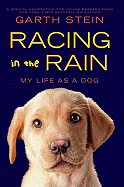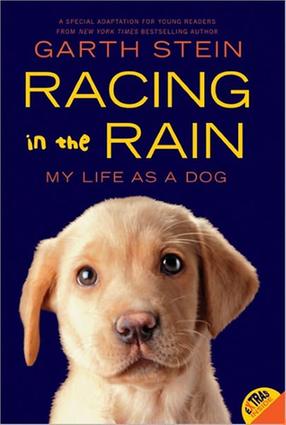
Racing in the Rain: My Life as a Dog by Garth Stein (Harper/HarperCollins, $16.99 hardcover 9780062015747; $6.99 paperback 9780062015761; 272p., ages 8-12, May 3, 2011)
 Why do a young reader's edition of the popular adult title The Art of Racing in the Rain (2008)?
Because every child has some of Enzo, a
charming lab-terrier mix, in him (or her). With a few adjustments (a slight
simplification of vocabulary and syntax, and a reworking of some adult themes),
Garth Stein has provided a version of his book that you may hand to any child.
Enzo, the wise and observant canine narrator, has advantages and disadvantages.
One of the chief advantages is access. People--adults--say things in front of
him they wouldn't say in front of others. So Enzo is privy to conversations and
information that Denny, his owner, is not. He has nearly full access to the
human world, yet, as a canine, he also possesses highly attuned senses. He can
smell where Denny has been all day and what he has eaten. He feels the mist of
the Seattle skies and the squish of mud beneath his paws, and he can read body
language and facial expressions like a secret code. He is fully in the moment--as
are children.
Why do a young reader's edition of the popular adult title The Art of Racing in the Rain (2008)?
Because every child has some of Enzo, a
charming lab-terrier mix, in him (or her). With a few adjustments (a slight
simplification of vocabulary and syntax, and a reworking of some adult themes),
Garth Stein has provided a version of his book that you may hand to any child.
Enzo, the wise and observant canine narrator, has advantages and disadvantages.
One of the chief advantages is access. People--adults--say things in front of
him they wouldn't say in front of others. So Enzo is privy to conversations and
information that Denny, his owner, is not. He has nearly full access to the
human world, yet, as a canine, he also possesses highly attuned senses. He can
smell where Denny has been all day and what he has eaten. He feels the mist of
the Seattle skies and the squish of mud beneath his paws, and he can read body
language and facial expressions like a secret code. He is fully in the moment--as
are children.
He loves Denny and comes to love the mate he chooses, Eve, and he loves the child they have together, Zoë. He cannot tell them because he cannot speak. He can show them, however, by staying at their sides and guiding them without words (and without thumbs, as he likes to point out). One day, Enzo smells something on Eve that is not right. He knows that something is very wrong, long before the doctors discover it. Stein does not shield children from pain and loss. Instead, he shows them that they, like Enzo, have the strength within them to make it through even the greatest challenges. And he often does it with humor.
Zoë has a great deal in common with Enzo. People say things to her--her maternal grandparents, for instance (Enzo "began calling them the Twins because they looked very much alike. They had the same shade of dyed hair. Plus they always wore matching outfits. And... they both smelled of chemicals: plastics and hair products."), that they would not say in front of most adults. Zoë is highly perceptive and suspects the Twins are up to something, yet she is powerless to make her own destiny. She must rely on the adults around her--just like Enzo.
When Denny, a racecar driver, leaves the house, he leaves on the TV for Enzo. One day, Enzo watches a film about Mongolia. When a dog dies in Mongolia, his master whispers into the dog's ear his wish that the dog return as a man. "Not all dogs return as men," Enzo explains, "only those who are ready." He learns everything he can to get ready to be a man. Enzo is preparing.
When Eve becomes ill, Enzo, Denny and Zoë must cope with her absence while she's in the hospital. After her release, the Twins suggest that they care for Eve in their home so that Denny can continue working. They also suggest that Zoë stay with her mother. The Twins have a plan: they are gradually taking hold of Eve and Zoë. Enzo and Denny's pack is scattered, their lives are pulled in every direction. This new arrangement stretches them thin--and goes on for much longer than they'd imagined.
Denny's training and success depend upon being in the moment, and forgetting any mistake that could consume his thoughts and cause him to miss an opportunity--or to crash. He must wait for each chance to gain position, slowly moving up to win the race. Enzo, on the other hand, seeks immediate gratification. He wants his pack together. Now. On Enzo's quest to prepare to be a man, he tries to learn from Denny, to persevere, to be patient, to seize the moments when they present themselves. And Enzo is improving all the time.
At first, Enzo resents Eve. But he allows a bond to develop between them. It's different from his with Denny, but it is a bond nonetheless. When Eve gives birth to Zoë, he confides, "I wished, at the time, that the baby would look like me." Zoë is instantly part of his pack, and he is her protector. When Eve has her first crippling bout with her illness, Denny is away racing. Eve takes Zoë and goes to stay with the Twins. In her haste and her pain, she forgets about Enzo. For three days, he is alone. He finds the toilet bowl as a water source; he makes his food last. He even confines his "business" to one mat by the door. But then Zoë's stuffed zebra destroys all of the child's other stuffed toys, framing Enzo for the mess. In his head, Enzo denies the destruction, just as children vehemently deny wrong actions they've committed. Something (the zebra) overtakes their thoughts and they do things they can't imagine themselves doing. It wasn't Enzo, it was the zebra.
The zebra becomes a recurring theme in the book, and a barometer for Enzo's growth. When Enzo learns the Twins' plan to keep Zoë with them, he goes head-to-head with the zebra, and he comes to a realization. "The zebra is something inside of us. Our fears. Our own self-destructive nature," he says. "The zebra is the worst part of us when we are face-to-face with our worst times." This epiphany allows Enzo to take responsibility for himself, and also to keep Denny on track to remain true to himself, too.
We know from the beginning that Enzo is letting go. This is a book about letting go, about keeping those you love with you and honoring them even when they cannot physically be with you. It's also about finding a way to access your best self in the worst of circumstances. It's a valuable lesson, at any age. And Enzo is a great teacher.--Jennifer Brown

